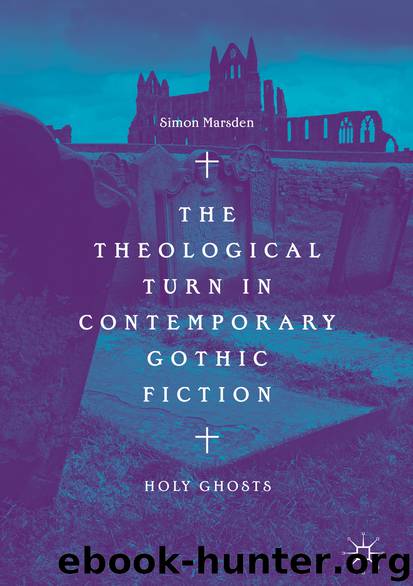The Theological Turn in Contemporary Gothic Fiction by Simon Marsden

Author:Simon Marsden
Language: eng
Format: epub
ISBN: 9783319965710
Publisher: Springer International Publishing
Legion , then, depicts evil not as inflicted directly upon humanity by an act of divine will but as the necessary condition of a world in which human subjects, fallen from a state of original union by their desire to shape their own being, aspire and struggle to regain the lost harmony. Paul Ricoeur has argued that myths of the origins of evil are always representations of humanity’s division from what we consider sacred and serve to situate this experience within a narrative trajectory that points towards the restoration of what has been lost.32 Kinderman’s theory echoes this mythical and biblical narrative trajectory from Fall to Apocalypse. Evil and suffering are not punishments imposed upon humanity by God, but necessary conditions of being in time. Legion ends on Kinderman’s glimpse of a diner-owner giving food to a beggar, a small moment of human kindness to close a narrative of extreme violence. ‘Hurrah for Karamazov!’ (L: 333), he whispers to himself in the novel’s final words.
Kinderman’s theory of evolution as a movement towards the reunification of a divided universe has a precedent in The Exorcist . Father Lankester Merrin, the experienced exorcist who assists Karras in the case of Regan MacNeil, holds a similar view, though with the difference that Merrin frames the process in explicitly Christological terms. Karras observes of Merrin that ‘[h]is books had stirred ferment in the Church, for they interpreted his faith in terms of matter that was still evolving and destined to be spirit that at the end of time would join with Christ, the “Omega Point”’ (TE: 319). Though Merrin is in some ways a figure of tradition—an experienced exorcist at a time when few Catholic priests still believe in literal demons—his theology is a radical reinterpretation of orthodox doctrine and eschatology. This apparent tension between tradition and innovation is the crux of Merrin’s theology and distinguishes him—and Blatty’s fiction—from the work of Altizer and the Death of God theologians. Where Altizer saw in the death of the transcendent God the beginning of a newly incarnational faith, Merrell grounds his ethical convictions in transcendence:I think the demon’s target is not the possessed; it is us…the observers…every person in this house. And I think – I think the point is to make us despair; to reject our own humanity, Damien: to see ourselves as ultimately bestial, vile and putrescent; without dignity; ugly; unworthy. And there lies the heart of it, perhaps: in unworthiness. For I think belief in God is not a matter of reason at all; I think it finally is a matter of love: of accepting the possibility that God could ever love us. (TE: 345)
Download
This site does not store any files on its server. We only index and link to content provided by other sites. Please contact the content providers to delete copyright contents if any and email us, we'll remove relevant links or contents immediately.
4 3 2 1: A Novel by Paul Auster(11052)
The handmaid's tale by Margaret Atwood(6856)
Giovanni's Room by James Baldwin(5879)
Big Magic: Creative Living Beyond Fear by Elizabeth Gilbert(4723)
Asking the Right Questions: A Guide to Critical Thinking by M. Neil Browne & Stuart M. Keeley(4576)
On Writing A Memoir of the Craft by Stephen King(4214)
Ego Is the Enemy by Ryan Holiday(3991)
Ken Follett - World without end by Ken Follett(3973)
The Body: A Guide for Occupants by Bill Bryson(3802)
Bluets by Maggie Nelson(3711)
Adulting by Kelly Williams Brown(3671)
Guilty Pleasures by Laurell K Hamilton(3587)
Eat That Frog! by Brian Tracy(3514)
White Noise - A Novel by Don DeLillo(3436)
The Poetry of Pablo Neruda by Pablo Neruda(3367)
Alive: The Story of the Andes Survivors by Piers Paul Read(3312)
The Bookshop by Penelope Fitzgerald(3229)
The Book of Joy by Dalai Lama(3218)
Fingerprints of the Gods by Graham Hancock(3214)
